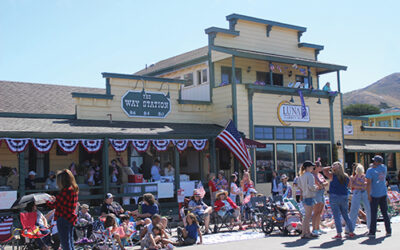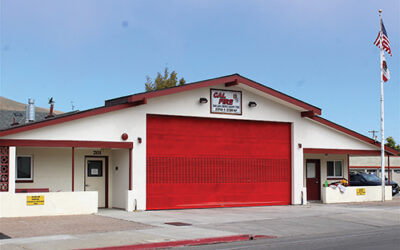By Neil Farrell
The Morro Bay City Council made official its actions to slow the spread of the coronavirus, mirroring actions taken by the Governor to prohibit evictions and mortgage foreclosures, as well as prohibit price gouging during the public emergency.
According to a staff report from City Attorney, Chris Neumeyer, “In December 2019, an outbreak of respiratory illness due to a novel coronavirus [a disease now known as COVID-19] was first identified in Wuhan City, Hubei Province, China. COVID-19 is a respiratory disease that may result in serious illness or death and is easily transmissible from person to person.”
The Federal Centers for Disease Control reported on April 21 that there were over 776,000 COVID-19 (the disease caused by the coronavirus) cases, and more than 41,000 deaths in the U.S.
California Gov. Gavin Newsome declared a State of Emergency for California on March 4 and President Donald Trump declared a national state of emergency March 13.
That same day, the SLO County Emergency Services Director (County Administrative Officer Wade Horton) declared a local emergency and the Morro Bay City Manager Scott Collins followed suit on March 14, with the city council ratifying his actions on March 19.
All of these actions have led to shelter-at-home orders coming down from the Governor’s Office and closure of all non-essential businesses statewide. These were echoed by the County and in turn the City.
March 20, the first full day of the closures, saw the normally busy streets of Morro Bay empty of nearly all traffic and people, with nearly all stores closed.
The cessation of activity was dramatic and more than a bit frightening, causing uncertainty over the unprecedented actions being taken to fight an invisible and deadly enemy from spreading like, well, like a virus.
“Because of these emergency conditions due to the continuing COVID-19 pandemic,” Neumeyer said, “many people are experiencing or will experience substantial loss of income as a result of business closures, the loss of hours or wages, or layoffs related to COVID-19, hindering their ability to keep up with rent or mortgage payments, leaving them potentially vulnerable to eviction or foreclosure.”
As part of its emergency orders coming down from the State, the City Council adopted a trio of protections for citizens and businesses — an eviction relief/eviction moratorium; mortgage relief/judicial foreclosure moratorium; and price gouging and profiteering prohibitions — in its actions.
Gov. Newsome on March 27 issued an order that required renters to notify their landlords within seven days of rent being due if they were not going to be able to pay it due to the shutdown of the economy.
And on April 6, the California Judicial Council issued a rule that prohibited the issuance of summons, and the entry of defaults, in unlawful detainer actions (i.e., an eviction), “unless the court finds there is a health and safety reason [e.g., a health hazard],” Neumeyer said.
Newsome’s order is in effect until May 31, and the Judicial Council’s order is in effect until 90 days after the end of the emergency.
Under mortgage relief, the Governor on March 25 got “many major financial institutions to provide mortgage payment forbearances of up to 90 days to borrowers economically impacted by COVID-19.” Mortgage holders are being advised to contact their bank for more information on this.
April 6 the Judicial Council stayed court proceedings on judicial foreclosures, again until 90 days after the Coronavirus emergency orders are lifted. But this just covers court cases, and not foreclosures by a lender that don’t go through the court system.
As for price gouging, the Penal Code § 396 already prohibits price gouging and profiteering during emergencies.
Price gouging is charging more than 10% over the normal price of certain items before an emergency declaration. Those items include food or goods, goods or services used for emergency cleanup, emergency supplies, medical supplies, home heating oil, building materials, housing, transportation, freight, and storage services, or gasoline or other motor fuels for a price of more than 10 percent greater than the price charged by that person for those goods or services immediately prior to the proclamation or declaration of emergency, according to Neumeyer’s report.
The 10% hike limit isn’t absolute, however. If a seller can show that a price increase is due to increased costs to them for labor or materials, then the price hike can be more than 10% above normal price. But the seller must also limit increases to no more than 10% above the new wholesale cost.
Gov. Newsome’s Executive Order N-44-20 (issued March 4) extended the prohibitions on price gouging through Sept. 4, a date that figures in the City’s Resolution as well.
The Governor used the term, “unconscionably excessive price” defined as more than 50% greater than the person paid for the item. If the person made the item and did not buy it to resell, the limit is a 50% markup.
Every item sold above these limits is considered a violation and each violation would be a misdemeanor under the Governor’s orders.
Meanwhile in Morro Bay, the City’s actions included blocking off the public boat launch ramp, blocking Coleman Drive leading out to Morro Rock, and Atascadero Road at the High School, which leads to Morro Strand State Beach, to enforce it’s prohibitions against public gatherings and social distancing directives.
City Manager Scott Collins said they closed the beach parking lots, “Because social distancing measures were often not taking place at the Rock, especially during nice weather, and our local beaches were being used heavily as a get-outside destination, including people apparently treating the current situation as an opportunity to take a vacation.
“So, the closures were done to help encourage social distancing and send a strong message to would-be visitors to Morro Bay that now is not the time to come visit our town.”
The City has even posted the sidewalks on Embarcadero as one-way thoroughfares, with pedestrians walking north on one side and people heading south on the other.
If residents are in need of special help or want to check out the actions of the City and possible resources to help them get through this Pandemic, they can go online to: www.morrobayca.gov/covid19 or call the City’s COVID-19 hotline at: (805) 772-6278.
On the County level, see: ReadySLO.org or call (805) 543-2444 for information coming out of the County Health Department. The County has also set up a tip line to report businesses violating the shelter-at-home order, call (805) 788-2222.


